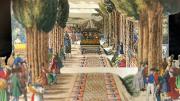The stock market plummets. Credit is tight. Bankers quake. Then J.P. Morgan organizes a consortium of financial saviors to provide cash to banks and trusts to stave off their collapse.

Cartoon courtesy of The Theodore Roosevelt Collection, Harvard College Library
In the cartoon above, entitled “You Dirty Boy!” President Theodore Roosevelt, A.B. 1880, LL.D. ’02, applies Honesty Soap to “Flim-Flam Finance.” The drawing—by Joseph Keppler, for his father’s weekly humor magazine, Puck—is one of 4,000 political cartoons in the vast Theodore Roosevelt Collection in the Harvard College Library. It appeared on September 4, 1907, when capital and confidence were both in short supply on Wall Street. Soon thereafter, Roosevelt went off to lunge after bear in the canebrakes of Louisiana, but he returned to his desk in time to appear interested in the prospectively devastating run on banks that October. The Panic of 1907 was one of the nation’s most severe financial crises ever and led ultimately to the establishment of the Federal Reserve System in 1913.
Whose faces did Keppler put in his suds? By rights, says the collection’s curator, Wallace F. Dailey, they should include that of flimflammer F. Augustus Heinze, but he was then only in his thirties. His failed scheme to corner the stock of United Copper Company touched off the panic.
One of the faces might be John D. Rockefeller’s, Dailey suggests. Judge Kenesaw Mountain Landis had fined Rockefeller’s Standard Oil more than $29 million in August, in an anti-rebate case. (But note that Rockefeller, as good guy, was hugely helpful in October’s bailout of banks.)
“Conservatives blamed Roosevelt…for jamming regulatory levers into the American economic machine,” Edmund Morris writes in his biography Theodore Rex. And they doubted that he knew what he was doing. “Radiant and purified from his hunt,” writes Morris, “he patrolled the Executive Office with his hands behind his back, regaling all comers with his exploits in the canebrakes.
“‘Do I look as though those Wall Street fellows were really worrying me?’
“‘No, Mr. President, you certainly do not.’
“‘I’ve got them,’ he said through his teeth, ‘on the run.’
“It was exchanges such as this that persuaded some men that Roosevelt was fiscally retarded.”






